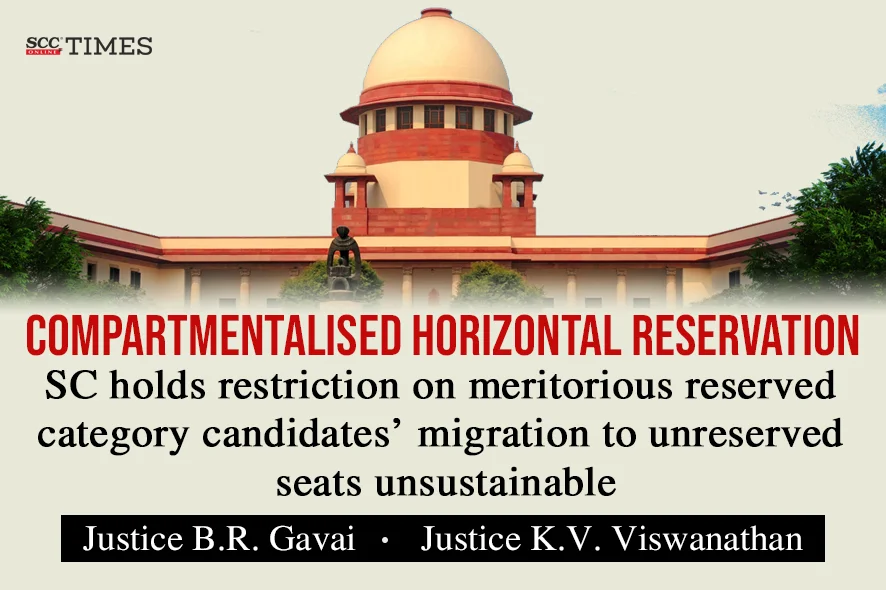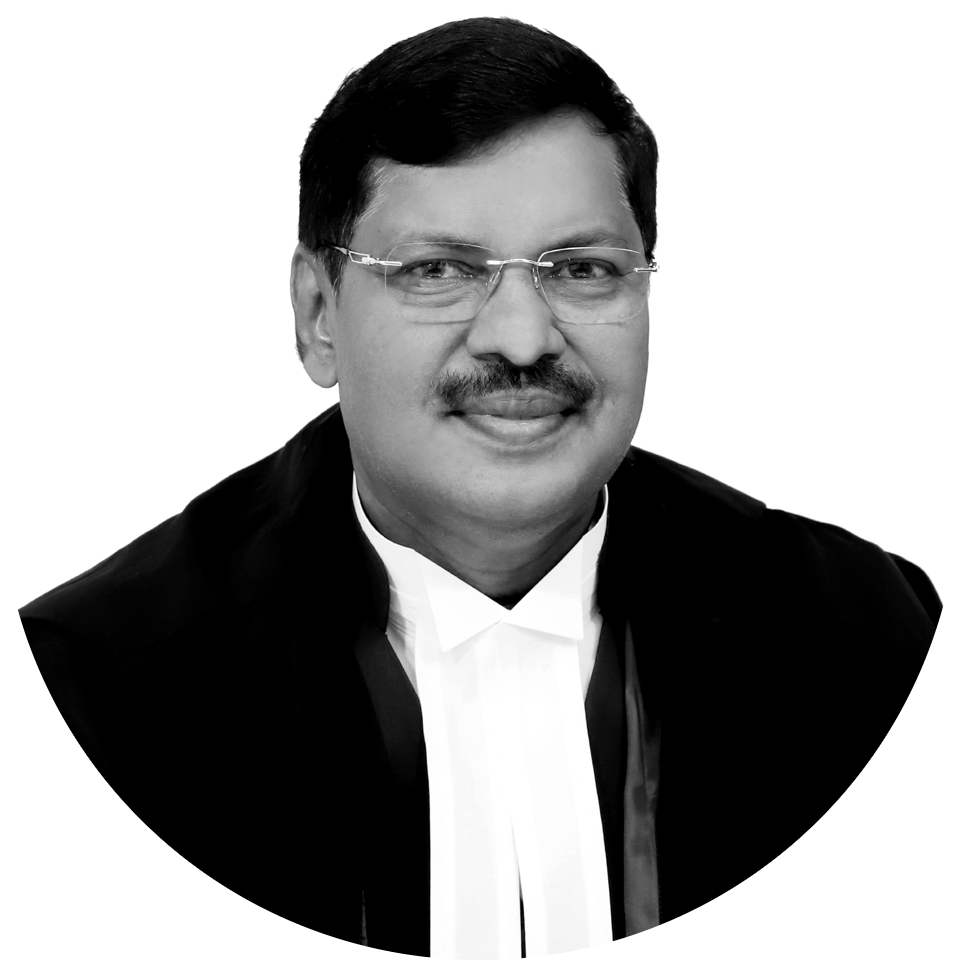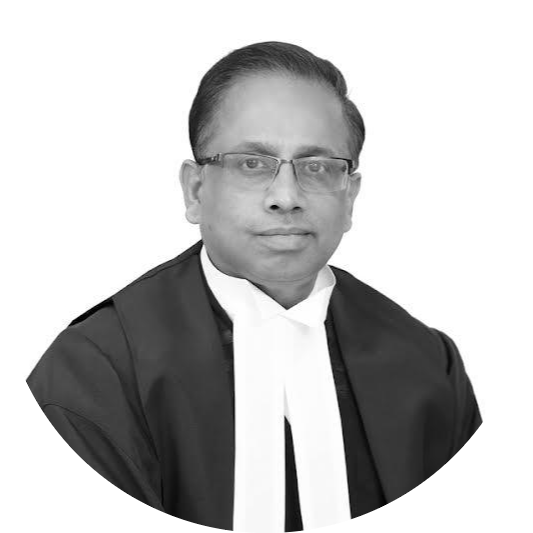Supreme Court: The Division Bench of B.R. Gavai* and K.V. Viswanathan, JJ., considered instant the appeals revolving around non-allotment of MBBS Unreserved (UR) Category Government School (GS) quota seats to the meritorious reserved category candidates, who had passed from the Government Schools by the Department of Medical Education. The Court, considering the law laid down by the Supreme Court in Saurav Yadav v. State of Uttar Pradesh, (2021) 4 SCC 542 and reiterated in Sadhana Singh Dangi v. Pinki Asati, (2022) 12 SCC 401, held that the methodology adopted by the respondents in compartmentalising the different categories in the horizontal reservation and restricting the migration of meritorious reserved category candidates to the unreserved seats was totally unsustainable.
The Court held that meritorious candidates belonging to SC/ST/OBC, who on their own merit, were entitled to be selected against the UR-GS quota, have been denied the seats against the open seats in the GS quota. Therefore, the appellants were deprived of their legitimate claim of admission against the UR-GS category in the Academic Session 2023-24.
Background and Legal Trajectory: On 19-6-2019, the amendment by the State Government to the Madhya Pradesh Education Admission Rules, 2018 (Admission Rules, 2018) were notified establishing new sub-rules that defined “category” and the method to fill vacancies for category wise reservation.
On 7-5-2023, the NEET (UG) Examination was conducted in which the appellants appeared.
On 10-5-2023, the State of Madhya Pradesh notified another amendment in the Admission Rules, 2018 adding a new sub-rule that defined “Government School” and the students who could fall under the category of “Government School Students”. A new table in existing Schedule 2(b) detailing the quantum of reservations was added, in which 5% of the total seats were reserved for government school students.
Results of NEET (UG) were declared on 13-6-2023 and on 25-7-2023, an advisory was issued notifying that the Admission Rules, 2018 as amended on 10-5-2023 would apply to the counselling process.
Thereafter, on 22-8-2023, the Respondents issued seat wise distribution of medical colleges at the end of the 2nd round of counselling. Since several seats remained vacant according to Rule 2 (g) of the Admission Rules, 2018, the vacancies were transferred from one category to other categories. In the instant case, out of 89 unreserved seats for Government School students, 77 were sent to the open category.
Aggrieved by the fact that the vacant seats were going to be released to the unreserved category, the appellants filed writ petitions before Madhya Pradesh High Court praying that the meritorious reserved category students who have studied in Government Schools, must be allotted MBBS seats of unreserved category government school quota before they are released to the open category.
The writ petitions were dismissed by the High Court thereby culminating in the instant appeals. The Court vide its interim order dt. 12-8-2024, directed the respondent to keep seven seats vacant in MBBS course, so that if the appellants succeed, they can be accommodated against the said seats.
Court’s Assessment:
Perusing the appeals, the Court stated that it is a well-settled principle of law courtesy Indra Sawhney v. Union of India, 1992 Supp (3) SCC 217, that a candidate belonging to any of the vertical reservation categories, who because of his own merit is entitled to be selected in the open or general category, will be selected against the general category and his selection would not be counted against the quota reserved for such vertical reservation categories.
The Court further stated that in Saurav Yadav case (supra), for the first time, the Court had to consider whether the principle laid down in Indra Sawhney (supra) would apply in the cases of Horizontal Reservation.
The Court in Saurav Yadav (supra) had affirmed Gujarat High Court’s position in Tamannaben Ashokbhai Desai v. Shital Amrutlal Nishar, 2020 SCC OnLine Guj 2592, which had considered and given effect to both vertical and horizontal reservations and had observed that a meritorious reserved category candidate who is entitled to the General category of the said horizontal reservation on his own merit, will have to be allotted a seat from the said General category of the horizontal reservation. Meaning thereby such a candidate cannot be counted in a horizontal seat reserved for the category of vertical reservation like SC/ST.
The Court further took note of observations made by S. Ravindra Bhat, J., in Saurav Yadav case (supra) wherein he said that, “Reservations, both vertical and horizontal, are method of ensuring representation in public services. These are not to be seen as rigid “slots”, where a candidate’s merit, which otherwise entitles her to be shown in the open general category, is foreclosed, as the consequence would be, if the State’s argument is accepted. Doing so, would result in a communal reservation, where each social category is confined within the extent of their reservation, thus negating merit. The open category is open to all, and the only condition for a candidate to be shown in it is merit, regardless of whether reservation benefit of either type is available to her or him.”
The afore-stated view in Saurav Yadav (supra) was reiterated in Sadhana Singh Dangi case (supra).
With the abovementioned legal position, the Court held that the methodology applied by the Department of Medical Education in compartmentalising different categories of horizontal reservation and restricting meritorious reserved category students from unreserved seats, cannot be sustained. Hence, the appellants were deprived of their legitimate claim of admission against the UR-GS category due to an erroneous application of the methodology in applying the horizontal and vertical reservation.
The Court noted that in the instant case, the cut-off for UR candidates were much less as compared to the cut-off for SC/ST/OBC/EWS candidates. As such, the respondents ought to have admitted the present appellants against the URGS categories. It was further noted that many seats from UR-GS category was required to be transferred to the General category.
Vis-a-vis the issue of grant of relief, the Court relying on S. Krishna Sradha v. State of Andhra Pradesh, (2020) 17 SCC 465, and pointing out to the interim order dt. 12-8-2024, directed the respondents to admit the appellants in the next Academic Session 2024-25 against the UR-GS seats.
The Court also set aside the impugned judgments passed by the Madhya Pradesh High Court in the writs filed by the appellants.
CASE DETAILS
|
Citation: Appellants : Respondents : |
Advocates who appeared in this case For Petitioner(s): For Respondent(s): |
CORAM :









